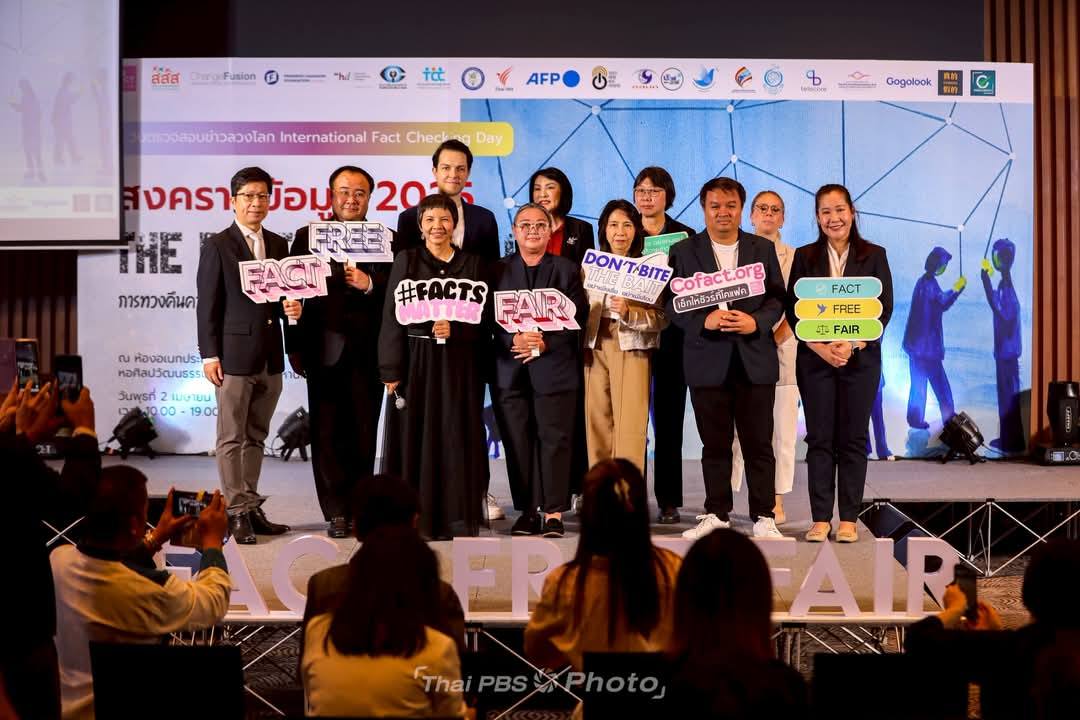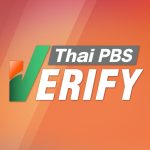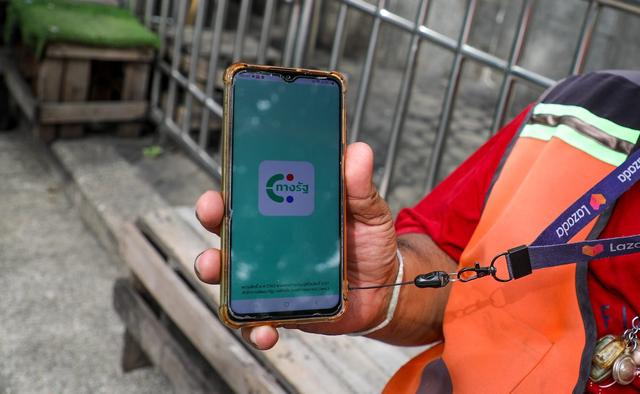It was also found that more than 400,000 people were deceived through online scams and filed complaints via the online reporting system, causing an estimated 60 billion baht in financial losses in 2024, according to data from Whoscall and the Royal Thai Police.
To raise public awareness and preparedness in an era overwhelmed by misinformation and fake news, a national seminar was organized on the occasion of International Fact-Checking Day 2025, under the theme “The Battle for Truth: Reclaiming Information Integrity in the Age of Distrust.”
The event, titled “Information Warfare 2025: The Challenge of Truth in an Age of Distrust,” was a collaboration between the Thai Health Promotion Foundation (ThaiHealth), Cofact Thailand, a network of 20 partner organizations, and Thai PBS Verify.
Ms. Benjamaporn Limpitthien, Deputy Manager of the Thai Health Promotion Foundation (ThaiHealth), stated that today, false information and disinformation can spread rapidly and without borders. According to the Global Risks Report 2024 published on www.weforum.org, within the next two years, misinformation and disinformation are projected to become the world’s top global risk, fueling political and social conflicts and directly impacting the economy — a trend already evident in Thailand over the past year.
During the major earthquake incident that affected Thailand, a large amount of fake news was circulated online. Scammers took advantage of the situation by sending fraudulent links via SMS and posting fake news links, leading to risks and threats to people’s property and personal data.
ThaiHealth, in collaboration with Cofact (Thailand) and its partner networks, organized a national seminar to promote critical thinking, data verification, and media literacy among the public. The initiative also aims to establish monitoring mechanisms for media and health information, fostering responsible and constructive media use as a social norm.
As part of its efforts, Cofact Thailand, supported by ThaiHealth, has been actively engaged in online fact-checking from 2020 to 2025. To date, it has compiled a database of over 10,000 verified items, making it the second-largest fact-checking database after Thailand’s Anti-Fake News Center. The platform has been accessed more than 500,000 times, reflecting the success of multi-sector collaboration in building a truth-driven society that helps citizens distinguish accurate information from disinformation and develop resilience against the harms of fake news.
Assoc. Prof. Dr. Preeda Akkarachantachoti, Dean of the Faculty of Communication Arts, Chulalongkorn University, stated that freedom of expression must go hand in hand with responsibility, and that accurate information forms the strong foundation of society. The Faculty of Communication Arts at Chulalongkorn University continues to collaborate with ThaiHealth, Cofact Thailand, and partner networks to advance the principles of fact-checking, aiming to strengthen public resilience against misinformation and promote a safe and trustworthy communication environment.
Ms. Supinya Klangnarong, Co-founder of Cofact (Thailand), stated that according to the Royal Thai Police’s report on online fraud in the first quarter of 2024, financial losses amounted to 60 billion baht, reflecting the severity of the problem and its impact on Thailand’s economy.
This year, Cofact Thailand, in collaboration with ThaiHealth, continues to strengthen its efforts to combat misinformation through partnerships with 11 media organizations. The initiative focuses on proactive strategies, such as launching the “Donate Fake News” campaign, which encourages the public to submit misinformation for analysis and verification, allowing accurate information to be widely disseminated.
Daniel Funky, Head of Digital Investigation for Asia-Pacific at AFP News Agency, Hong Kong, stated that amid today’s information warfare, public trust in information has significantly declined due to the spread of false and distorted content from various news sources and propaganda outlets. Therefore, everyone must play a role in developing media literacy and participating in the process of information verification.
“Trust in information may not return easily. There must be a continuous and repetitive process of verification to restore that trust.”
Jeff Kuo, CEO and Co-founder of the Whoscall application, stated that AI presents both opportunities for innovation and challenges, as it is also being used as a tool by scammers.
One in four Thais has been scammed, with an average loss of 36,000 baht per person, leading to a decline in public trust. Gogolook, a technology company, collaborates with both government and private sectors to detect and intercept phone scam data.
“Technology itself does not build trust — it is people who build trust, when everyone takes part in verifying information.”
The event featured a variety of engaging activities, such as a panel discussion on “Information Warfare 2025: How Can the Media Help Society Access the Truth?” featuring leading figures from the media industry. Lightning Talks under the theme “Upgrading the Response to Disinformation 4.0” were held by fact-checkers including Cofact Taiwan, AFP News Agency, Thai PBS, and Sure and Share (MCOT) presented “From the Telegraph Era to the Age of AI: How to Stay Ahead,” showcasing how communication has evolved and how society can effectively keep pace by the National Science Museum (NSM)






